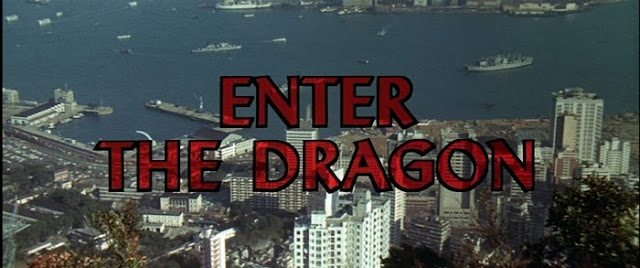Because it's Asian Pacific American Heritage Month, I've dug up a 1998 article that I wrote for the UC Santa Cruz publication Primer to celebrate what was then the 25th anniversary of a pivotal movie in the history of Asian American cinema, as well as one of the few martial arts flicks I like (just because I'm Asian doesn't mean I have to be a fan of the martial arts genre). Some hardcore martial arts genre fans will argue that Enter the Dragon shortchanges Bruce Lee or that it's too Hollywood and too derivative of the 007 franchise, but because I'm not a hardcore martial arts fan, I don't have the same gripes as they do.
Okay, maybe I'm with them on the "What the hell is John Saxon doing here?" thing. ("America had no idea that [Saxon] was also a practicing martial artist... He first became involved in the martial arts when he was 15 years old, initially studying judo and then taking up karate," wrote author John Little in the Enter the Dragon: The Making of a Classic Motion Picture book that Warner Home Video included in the 1998 Enter the Dragon VHS and DVD gift sets.) But otherwise, Enter the Dragon never fails to entertain, and it features the most badass score ever written for an Asian American action hero: the frequently sampled score by Lalo Schifrin, whose Mission: Impossible theme was one of Lee's favorite pieces of workout music.
---------------

Ain't that a kick in the head: Bruce Lee and Enter the Dragon still amaze after 25 years
By Jimmy Aquino
Bruce Lee made only five films and the then-unfinished Game of Death before he died from a mysterious swelling of the brain (or died from a curse or was assassinated, if you believe the conspiracy theorists) in Hong Kong on July 20, 1973, but 25 years later, fans are still flocking to his movies and kneeling at the church of jeet kune do, Lee's revolutionary kung fu technique emphasizing "the way of the intercepting fist."
Lee's female admirers make pilgrimages to Hong Kong. Men of all colors want to be like Lee, who taught martial arts to students of all races, creeds, genders and backgrounds, unlike his kung fu teacher elders, who were opposed to teaching students who weren't Chinese.
The first martial arts superstar, Lee was a genuine fighter and a charismatic actor (I'm not saying Lee was De Niro, but his "emotional content" speech in Enter the Dragon has more soul and passion than what passes for acting in Jean-Claude Van Damme and Steven Seagal movies). Not even charismatically challenged poseurs like Van Damme, the faded Seagal and David Carradine could erase the memory of the lightning-quick legend nicknamed the Dragon, a pioneer in Asian American cinema who sought stardom on his own when racist Hollywood spurned him because producers didn't think an Asian man could sell tickets or rack up Nielsens. (Van Damme, the post-Under Siege Seagal and Carradine are to martial arts what Vanilla Ice was to hip-hop. Put these has-beens in a room with Lee, and he'd automatically win the throwdown, with moves like the 13 punches he could throw in half a second.)

Enter the Dragon made Hollywood put its foot in its mouth. Released a few weeks after Lee's death, the film was his most popular work, and it made him the first Asian male sex symbol. (Bruce's son Brandon also found stardom posthumously, with 1994's The Crow.) To mark its 25th anniversary, Warner Bros. re-released Enter the Dragon in Lee's birthplace, San Francisco, and put out a highly anticipated DVD. The movie still holds up well today. The script is standard kung fu B-movie material, but Lee is at his most charismatic, the production values are stunning and the martial arts choreography is legendary. As SF Weekly's Michael Sragow said, Lee makes his choreographed moves look spontaneous. Lee's fighting style is, as his character describes it in the film, "the art of fighting without fighting."
Primer dedicates this page to the man who once said, "The end of heroes is the same as ordinary men. They all die and gradually fade away in the memory of man." Famous last words from someone whose memory has hardly faded at all. (To the managers of the Nickelodeon or the Rio, if you're reading this, please bring Enter the Dragon to Santa Cruz or we're gonna have to get kung fu on your asses!)

No comments:
Post a Comment